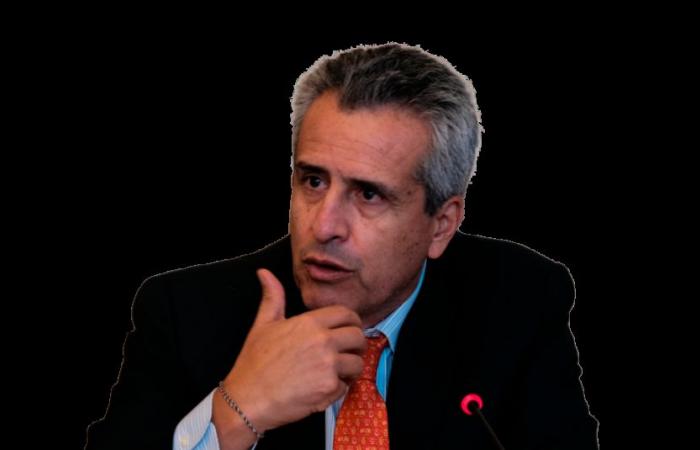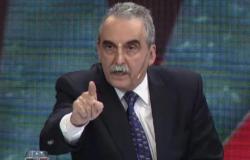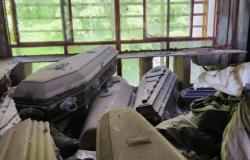
12:01 AM
Congress concluded sessions this week and – as usual – the eagerness, the fights and all kinds of controversies marked the closure. The balance has nuances depending on the political side you believe. For the opposition, the difficult processing of projects such as the pension reform or the difficulties in advancing motions of censure are proof that guarantees were lacking. Another is the Government’s reading.
For the Minister of the Interior, Luis Fernando Velasco, the balance “is successful” and the legislature “was much sweeter than sour,” despite the fact that two of the reforms at the heart of Petrism – health and education – ended up shipwrecking.
In dialogue with EL COLOMBIANO, the minister of politics defends the maneuvers to move the pension forward, recognizes that a “political clumsiness” caused the collapse of the statutory education fund and refers to the new projects that will be established. He also insists on a political agreement, reveals that it is necessary to rethink the relationship with Congress and does not rule out “bringing people from the parties” regarding the ministerial shake-up. He even talks about his permanence in the cabinet.
For you, the legislative balance was successful. Could it be considered as such when two of the Government’s social reforms collapsed?
We achieved the most important social reform in recent years (the pension reform) and we left the labor reform alive. We are going to create Ecominerals to formalize small mining. We moved forward with the investment protection pact with Venezuela. We complied with the statutory law of agrarian jurisdiction, which had not been approved and was a central issue of point one of the Peace Agreement.
We have the largest debt quota and the largest budget in recent years, and we endorse the Development Plan of this Government. Culturally, changing the conception and banning bullfighting is a gigantic human advance.
So if you say ‘I’m going to do a million things and you do 100 things well’, then obviously people are going to say ‘it failed’. I believe that we put forward a very successful legislative agenda and what the Government has to learn is that when it reaches a Congress where it does not have majorities, it has to set achievable goals.
That is, were they ambitious with so many projects?
We started with an ambition that, among other things, I did not raise. I just inherited the agenda. If you had asked me I would have said ‘let’s focus on this, this and this’. This is what I am going to propose to the Government. We cannot come out next legislative year with a bunch of projects. We have to focus on what we have to focus on and move it forward, spending all our time and all our energy.
I have spent twenty-something years in Congress. My last almost 30 years I have been between Congress and the Government, and I can say that this was a truly successful legislature. Sure, we have opposition and they may tell us that it is bittersweet, but it is much sweeter than sour.
Are you completely calm about the pension reform?
Completely.
I ask because you are already thinking about presenting complementary projects. Isn’t that a sign that perhaps there was effort in the process? There were those who complained that the same text from the Senate was accepted in the Chamber…
No, there was no rush. Let’s look at the real facts: this Monday, Tuesday and Wednesday, due to the Opposition Statute, the Senate handed over the management of the legislative agenda to them. Obviously they would not have scheduled us for pension reform. That is to say, if we do not do what we did in the Chamber, the pension reform will sink. It is a bold decision. It is a political decision that we share between Congress and the Government, and I think it was a good decision.
It is likely that because of that decision we missed a point or two that could be improved. Well, now let’s look for how we improve them, but we have a very good pension reform.
And do you have the peace of mind that it is legally protected? They are already announcing lawsuits in the Constitutional Court…
It is fully armored. The central element of the Court’s analysis is the principle of publicity. The Court asks: ‘Did the congressmen know or did they not know the reform that was going to be debated?’ Of course they knew her! Since April it was published in the annals of Congress, in the Gazette. There is.
Of course it had publicity and the congressman’s obligation is that, when the Gazette arrives, he must read it. And if he doesn’t arrive, go and ask for it, or download it from the cloud and read it. That project was published well in advance. It was also debated.
The pension reform was in the House for two weeks. The opposition asked for a hearing and it didn’t happen, so you end up wondering, ‘well, what did they really want? Did they want to debate it or was their only objective to sink it?’ I think the House and our allies made a good decision.
There was controversy due to the avalanche of resources and proposals. Do you think the opposition focused more on formal issues than on substantive objections?
It is a bill with 90 articles and they put 800 propositions, 150 impediments and 110 challenges in it… Let’s be honest. I ask for honesty in the debate. Did you want to debate or was the only objective to sink it? I ask that question and deliver these elements. I do not give the answer, but let the reader give his own answer.
What happened to the education reform? Who is responsible for its collapse? Opposition and Petrism blame each other, but it is not known for sure who is responsible.
We as a Government committed a political mistake. The reform was highly agreed upon. But hey, it is a reform that we are going to present again on July 20 and I am sure that this time it will be more successful because we are going to correct the political errors that we may have made.
I don’t want to individualize any responsibility. In Congress there are laws that pass and laws that do not pass. This was a law that did not pass. Spot. It is presented again.
What was that political clumsiness?
It was clumsy. And if I tell you, it means beginning to individualize responsibilities and I believe that in the actions of Congress, both successes and failures, have to be of teams and not just of people.
Were you left with any frustration? Maybe some project that sank, that could not be carried out…
No. I feel that it was a good legislative agenda. I have been in Congress and have been since Andrés Pastrana was president. I accompanied the two terms of former President Álvaro Uribe. Both from former president Juan Manuel Santos. The period of Iván Duque. And as a minister I have been in the period of President Petro and I have seen very important regulations that are approved and very important regulations that are sunk. But in terms of social content, I believe that the most important since I have been in Congress is undoubtedly the pension reform.
And the fact that the labor reform remains alive and that we are currently in a concertation process to re-present the health reform tells me that we have had good legislative action.
What’s coming for the next legislative period? Health reform, education reform, justice reform…
I would believe that we must insist on the statutory education law. We must once again present the health reform in a more concerted manner and much more understandable, as well as more practical for debate. We must get our hands on justice. I was the speaker of the legislative act that went from the inquisitorial system to the adversarial system and for that system to work it is necessary to strengthen the investigative bodies of the State, but also for prosecutors to be able to negotiate sentences.
In recent years we have made more than 90 modifications to the Penal Code, removing any possibility of negotiation. That’s crazy. That is to say, we have a reward system in which the offender is shown that the State has a way to convict him and in exchange for going to a long and expensive trial, that person says ‘ready, I did commit the crime. Reduce penalties, make me pay them in such a place, I accept and there is no process.’
They are processes that can last years and that can cost billions, ending up being short processes. That must be rescued and I believe that the Court is in that vein. I would not get involved in a justice reform on how justice is governed. I would get involved in a reform on justice for the citizen and Minister Néstor Osuna is working on that issue.
You were meeting with President Petro on Wednesday. What did he tell you? What is the president’s balance? What does he think of the collapse of the reforms?
He is very satisfied. He knows the struggles we fought and is evidently satisfied with the balance of the legislative agenda. He knows that we have new challenges next year.
Given this ministerial shakeup that the president himself confirmed, do you feel calm?
I am certain that my permanence or not is defined by the president, and so am I. I must think too. I am in a political project and I have to see where I am most useful for that political project. But it doesn’t wear me out to think about that, among other things, because I feel that I gave the country – and have advanced – a Ministry of social dialogue and peace. And a Ministry with legislative successes.
Of course the Government does not interfere in the election of the next presidents of the Senate and Chamber, but do you feel calm with the successful arrival of Efraín Cepeda (Conservative) to the Senate, who has been very critical of the Government?
Efraín is a serious parliamentarian. He is the most senior of the parliamentarians and I know him. I feel that if Congress elects Efraín to the Presidency of the Senate, he will not be able to block the task. He will give guarantees to the Government and the opposition.
You proposed to President Petro the need to rethink the relationship with Congress. Under what conditions would this agreement be reached?
It would be a political agreement. Saying, ‘look at our legislative agenda are these four or five core issues. Ladies and gentlemen, do you agree? Are we going to build this? We have this.’ It would be a true political agreement.
You don’t sit down first and say ‘let’s agree and then define what’. No, the first thing is to define the four or five themes. Ask if there is an agreement and move forward.
Could it be that the parties do accept the president’s confrontational attitude?
If the parties walk away from us, I would recommend to the president in the shock to bring people from the parties to help us defend the agenda. But not only people from the parties. A cabinet has 18 ministers. That gives us four or five people from the parties to help us defend that initiative. And there will be very technical people who we need to reinforce us in our task.
What did the president respond? Is he going to study it?
He has a virtue: he hears and hears. He responds little, but he listens and listens.





